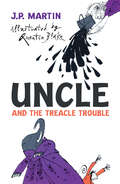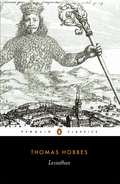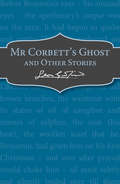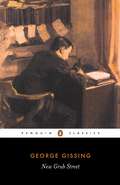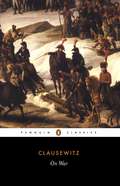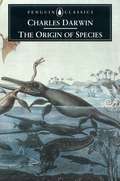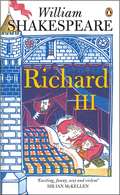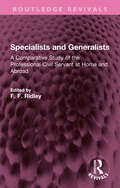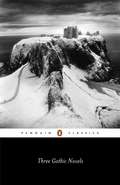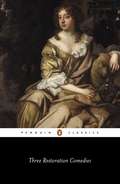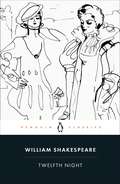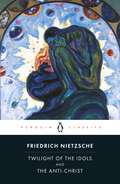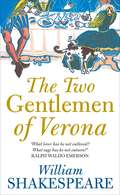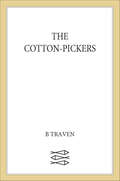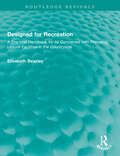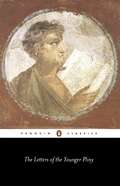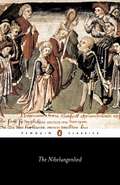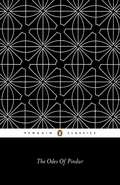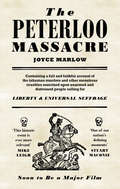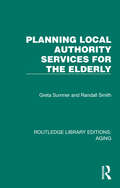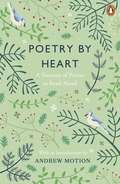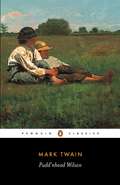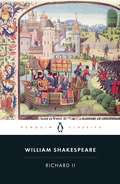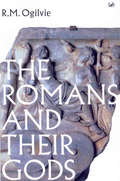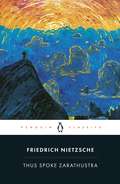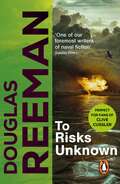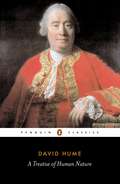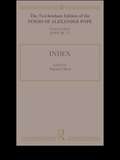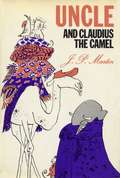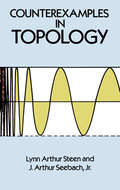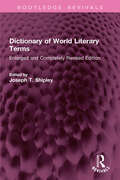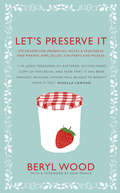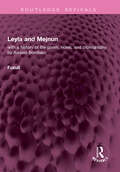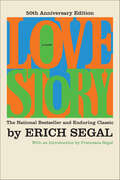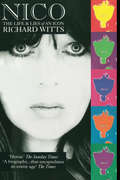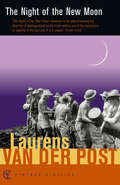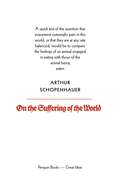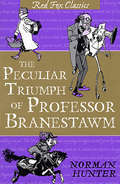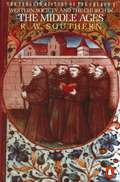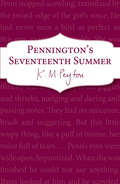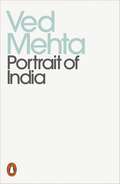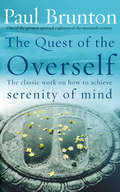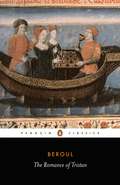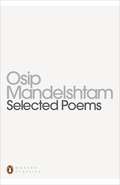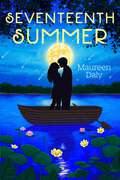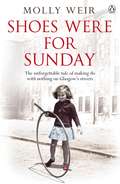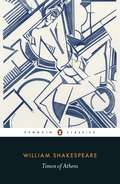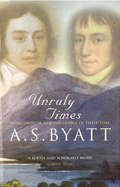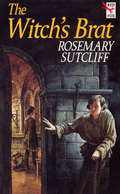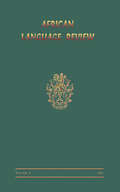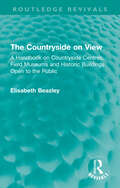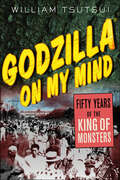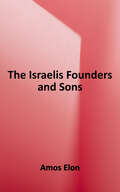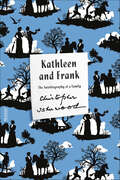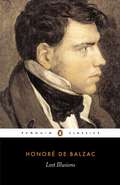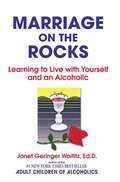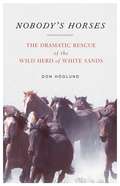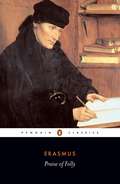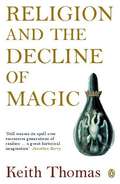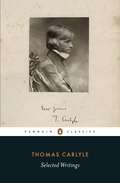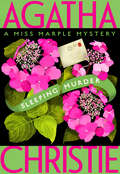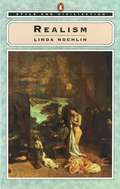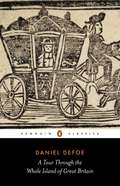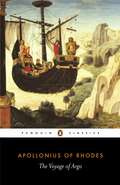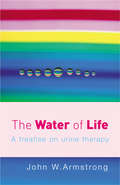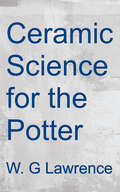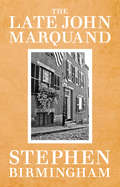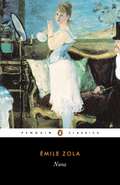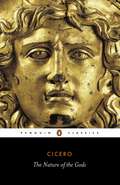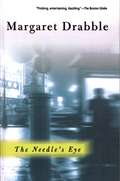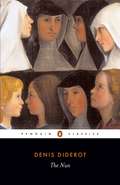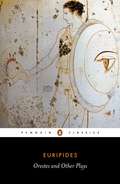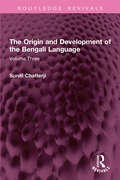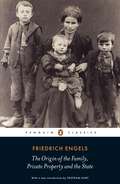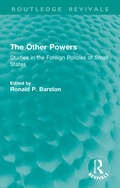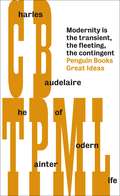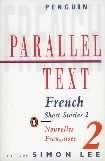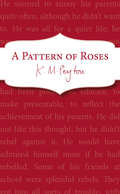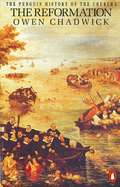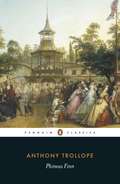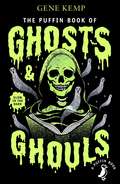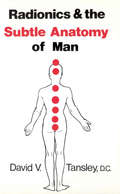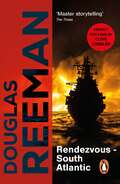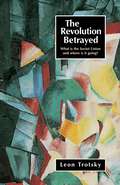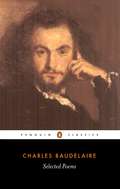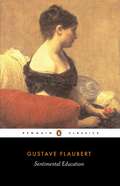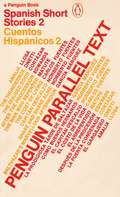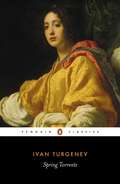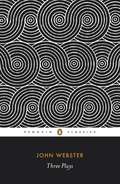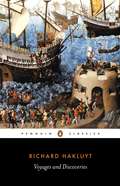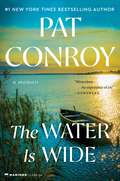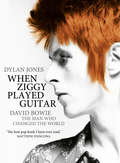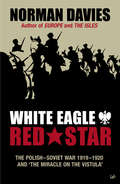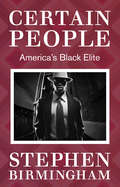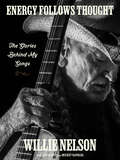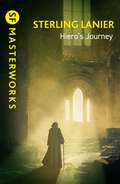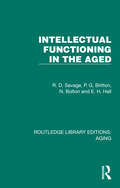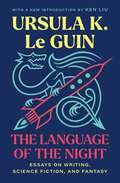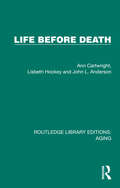- Table View
- List View
Uncle And The Treacle Trouble
by J. P. Martin Quentin Blake R N CurreyA great mural, commissioned by the King of the Badgers after the defeat of the Badfort crowd at Crack House, is to be painted on the wall at Homeward by Waldovenison Smeare. To protect the mural while it is being painted Uncle employs a watchman called Sleepy Sam, who sleeps in a wheelbarrow and is paid two loaves of bread and two quarts of Koolvat. Sleepy Sam is immediately put to work when Beaver Hateman tries to climb in through Uncle's window . . .
Leviathan
by Thomas HobbesThe Leviathan is the vast unity of the State. But how are unity, peace and security to be attained? Hobbes's answer is sovereignty, but the resurgence of interest today in Leviathan is due less to its answers than its methods. Hobbes sees politics as a science capable of the same axiomatic approach as geometry: he argues from first principles to human nature to politics. This book's appeal to the twentieth century lies not just in its elevation of politics to a science, but in its overriding concern for peace.
Mr Corbett's Ghost
by Leon GarfieldMr Corbett is a cruel employer and his young apprentice Benjamin can't help but wish he were dead. So when a strange old man offers to make this wish come true, Benjamin finds it impossible to refuse. Sure enough, Mr Corbett meets an untimely death, but the tables turn on the terrified apprentice who finds himself cursed with the ghost of the man he hated most in the world . . .A brilliant collection of three short stories from a master story-teller, who will keep you turning the pages until the very end.
New Grub Street
by George GissingIn New Grub Street George Gissing re-created a microcosm of London's literary society as he had experienced it. His novel is at once a major social document and a story that draws us irresistibly into the twilit world of Edwin Reardon, a struggling novelist, and his friends and acquaintances in Grub Street including Jasper Milvain, an ambitious journalist, and Alfred Yule, an embittered critic. Here Gissing brings to life the bitter battles (fought out in obscure garrets or in the Reading Room of the British Museum) between integrity and the dictates of the market place, the miseries of genteel poverty and the damage that failure and hardship do to human personality and relationships.
On War
by Carl ClausewitzWriting at the time of Napoleon's greatest campaigns, Prussian soldier and writer Carl von Clausewitz created this landmark treatise on the art of warfare, which presented war as part of a coherent system of political thought.In line with Napoleon's own military actions, he illustrated the need to annihilate the enemy and make a strong display of one's power in an 'absolute war' without compromise. But he was also careful to distinguish between war and politics, arguing that war could only be justified when debate was no longer adequate, and that if undertaken, its aim should ultimately be to improve the wellbeing of the nation.
The Origin of Species by Means of Natural Selection: Or the Preservation of Favoured Races in the Struggle for Life
by Charles DarwinWith his revolutionary work The Origin of Species Charles Darwin overthrew contemporary beliefs about Divine Providence and the beginnings of life on earth. Written for the general public of the 1850s, it is a rigorously documented but highly readable account of the scientific theory that now lies at the root of our present attitude to the universe. Challenging notions such as the fixity of species with the idea of natural selection, and setting forth the results of pioneering work on the ecology of animals and plants, it made a lasting contribution to philosophical and scientific thought.
Richard III
by William Shakespeare'Now is the winter of our discontent Made glorious summer by this sun of York'Shakespeare's final drama of the Wars of the Roses cycle begins as the dust settles on England after bloody civil war, and the bitter hunchback Richard, brother of the king, secretly plots to seize the throne. Charming and duplicitous, powerfully eloquent and viciously cruel, he is prepared to go to any lengths to achieve his goal. Richard III shows a man who, in his skilful manipulation of events and people, is a chilling incarnation of the temptations of power in a land shocked by war.Used and Recommended by the National TheatreGeneral Editor Stanley WellsEdited by E. A. J. HonigmannIntroduction by Michael Taylor
Specialists and Generalists: A Comparative Study of the Professional Civil Servant at Home and Abroad (Routledge Revivals)
by F. F. RidleyOriginally published in 1968, this book provides surveys of the Australian, French, German, Swedish and American systems of public administration. Previously unpublished material on the professional classes in Britain was made available which filled a gap in the (then) available textbooks on British government. A concluding chapter deals with the wider aspects of the generalist versus specialist problem, an original contribution to administrative theory. The book will be of interest to students of politics and government and the student of comparative administration, as well as to those concerned with civil service reform
Three Gothic Novels
by Horace Walpole Mary Shelley William BeckfordThe Gothic novel, which flourished from about 1765 until 1825, revels in the horrible and the supernatural, in suspense and exotic settings.This volume, with its erudite introduction by Mario Praz, presents three of the most celebrated Gothic novels: The Castle of Otranto, published pseudonymously in 1765, is one of the first of the genre and the most truly Gothic of the three. Vathek (1786), an oriental tale by an eccentric millionaire, exotically combines Gothic romanticism with the vivacity of The Arabian Nights and is a narrative tour de force. The story of Frankenstein (1818) and the monster he created is as spine-chilling today as it ever was; as in all Gothic novels, horror is the keynote.
Three Restoration Comedies
by George Etherege William Congreve William WycherleyAfter the restoration of King Charles II to the British throne in 1660, dramatists experienced new freedom in an age that broke from the strict morality of puritan rule and in which elegance and wit became the chief virtues. Irreverent, licentious and cynical, the three plays collected here hold up a mirror to this dazzling era and satirize the gulf between appearances and reality. In Etherege's The Man of Mode (1676), the womanizing Dorimant meets his match when he falls in love with the unpretentious Harriet, while Wycherley's The Country Wife (c. 1675) depicts the rakish Horner who fakes impotence to fool trusting husbands into giving him easy access to their wives. And in Congreve's Love for Love (1695), the extravagant Valentine can only win his beloved Angelica if he loses his inheritance.
Twelfth Night
by William Shakespeare'If music be the food of love, play on,Give me excess of it'Separated from her twin brother Sebastian after a shipwreck, Viola disguises herself as a boy to serve the Duke Orsino. Wooing a countess on his behalf, she is stunned to find herself the object of her affections. Amorous intrigues, practical jokes, sexual confusion and riotous disorder ensue in this lyrical, hugely popular romantic comedy, which shows both the delights and the perils of desire. Used and Recommended by the National TheatreGeneral Editor Stanley WellsEdited by M. M. MahoodIntroduction by Michael Dobson
Twilight of Idols and Anti-Christ
by Friedrich NietzscheIn these two devastating late works, Nietzsche offers a powerful attack on the morality and the beliefs of his timeNietzsche's Twilight of the Idols is a 'grand declaration of war' on reason, psychology and theology, which combines highly charged personal attacks on his contemporaries (in particular Hegel, Kant and Schopenhauer) with a lightning tour of his own philosophy. It also paves the way for The Anti-Christ, Nietzsche's final assault on institutional Christianity, in which he identifies himself with the 'Dionysian' artist and confronts Christ: the only opponent he feels worthy of him.Translated by R. J. Hollingdale with an Introduction by Michael Tanner
The Two Gentlemen of Verona
by William ShakespeareLeaving behind both home and beloved, a young man travels to Milan to meet his closest friend. Once there, however, he falls in love with his friend's new sweetheart and resolves to seduce her. Love-crazed and desperate, he is soon moved to commit cynical acts of betrayal. And comic scenes involving a servant and his dog enhance the play's exploration how passion can prove more powerful than even the strongest loyalty owed to a friend.
The Cotton-Pickers
by B. TravenThe first novel from the elusive author of The Treasure of the Sierra Madre.Set in the 1920s in Mexico, B. Traven’s The Cotton-Pickers tells the story of Gerald Gales, who drifts in and out of jobs--on a cotton plantation, an oil field, in a pastry shop, and on a ranch--exposing the dangerous exploitation at each station and fomenting workers’ rights along the way. Adventurous, funny, and full of humanity, TheCotton-Pickers challenges and delights readers to this day. "B. Traven is coming to be recognized as one of the narrative masters of the twentieth century." The New York Times
Designed for Recreation: A Practical Handbook for All Concerned with Providing Leisure Facilities in the Countryside (Routledge Revivals)
by Elisabeth BeazleyOriginally published in 1969, at a time when there was an ever-increasing number of people going to the coast and countryside at weekends and on holiday, this book filled a gap by providing detail on the physical results of all that needed to be done for the leisure-seeking public. It discusses juggling the needs of the public whilst maintaining the quality of the natural environment – a balancing act which remains as relevant in the 21st Century as when the book was first published. The book is intended for all those making provision for public recreation and countryside protection. The passing of the Countryside Act in 1968 in the UK necessitated detailed work for local authorities: the design and siting of car parks; public lavatories; litter bins, camp and picnic sites; swimming pools and information centres to name but a few. Elisabeth Beazley discusses the principles involved and illustrates successful and cautionary examples from both sides of the Atlantic as well as Continental Europe
The Letters of the Younger Pliny
by The Younger PlinyA prominent lawyer and administrator, Pliny (c. AD 61-113) was also a prolific letter-writer, who numbered among his correspondents such eminent figures as Tacitus, Suetonius and the Emperor Trajan, as well as a wide circle of friends and family. His lively and very personal letters address an astonishing range of topics, from a deeply moving account of his uncle's death in the eruption that engulfed Pompeii, to observations on the early Christians - 'a desperate sort of cult carried to extravagant lengths' - from descriptions of everyday life in Rome, with its scandals and court cases, to Pliny's life in the country.
The Nibelungenlied
by A. HattoWritten by an unknown author in the twelfth century, this powerful tale of murder and revenge reaches back to the earliest epochs of German antiquity, transforming centuries-old legend into a masterpiece of chivalric drama. Siegfried, a great prince of the Netherlands, wins the hand of the beautiful princess Kriemhild of Burgundy, by aiding her brother Gunther in his struggle to seduce a powerful Icelandic Queen. But the two women quarrel, and Siegfried is ultimately destroyed by those he trusts the most. Comparable in scope to the Iliad, this skilfully crafted work combines the fragments of half-forgotten myths to create one of the greatest epic poems - the principal version of the heroic legends used by Richard Wagner, in The Ring.
The Odes of Pindar
by Cecil Bowra'What Pindar catches is the joy beyond ordinary emotions as it transcends and transforms them' - C. M. BowraArguably the greatest Greek lyric poet, Pindar (518-438 B. C.) was a controversial figure in fifth-century Greece - a conservative Boiotian aristocrat who studied in Athens and a writer on physical prowess whose interest in the Games was largely philosophical. Pindar's Epinician Odes - choral songs extolling victories in the Games at Olympia, Delphi, Nemea and Korinth - cover the whole spectrum of the Greek moral order, from earthly competition to fate and mythology. But in C. M. Bowra's clear translation his one central image stands out - the successful athlete transformed and transfigured by the power of the gods.Translated with an introduction by C. M. Bowra.
The Peterloo Massacre
by The Estate Marlow***The subject of the new major film by Mike Leigh***Unity of the oppressed can make a difference in politically uncertain times A peaceful protest turned tragedy; this is the true story of the working class fight for the vote.On August 16 1819, in St Peter’s Field, Manchester, a large non-violent gathering demanding parliamentary reform turned into a massacre, leaving many dead and hundreds more injured.This catastrophic event was one of the key moments of the age, a political awakening of the working class, and eventually led to ordinary people gaining suffrage. In this definitive account Joyce Marlow tells the stories of the real people involved and brings to life the atrocity the government attempted to cover up. The Peterloo Massacre is soon to be the subject of a major film directed by Mike Leigh.
Planning Local Authority Services for the Elderly (Routledge Library Editions: Aging)
by Greta Sumner Randall SmithIn the 1960s, planning the development of services for the elderly was a subject of considerable importance in Britain, both because existing services were known to be inadequate, and because the proportion of older people, especially of those over seventy-five, was expected to increase during the next thirty years. Originally published in 1969, this book describes how a sample of local authorities were planning their services for the elderly, how they estimated the need for services and the availability of resources, and how they linked their plans with those of other organisations.
Poetry by Heart: Poems for Learning and Reciting
by Andrew MotionPoetry by Heart - based on the hugely successful nationwide schools competition, 200 magical poems to learn by heart'The poems we learn stay with us for the rest of our lives. They become personal and invaluable, and what's more they are free gifts - there for the taking' Simon ArmitageTwo years ago former Poet Laureate Andrew Motion had the idea of setting up Poetry by Heart - a nationwide annual competition for secondary schools which asked contestants to learn two or three poems and be judged on their recitations, first at school level, then regional, then in a national final held at London's National Portrait Gallery. It's proved a huge success, with hundreds of schools participating in the first year, and numbers up by 20% in the second. Coinciding with the start of the third year of competition, and published on National Poetry Day whose theme coincidentally in 2014 is Recitation, this Poetry by Heart anthology brings together the pool of poems - 200 altogether - from which contestants make their choices. Specially picked by Motion and his three co-editors, these poems make up a treasure house - of almost-unknown poems and familiar poems from the mainstream; love poems and war poems; funny poems and heartbroken poems; poems that recreate the world we know and poems written on the dark side of the moon. And all chosen with a view to their being recited out loud.From William Wordsworth to Wilfred Owen, Emily Brontë to Elizabeth Bishop this wonderfully enjoyable anthology will be enjoyed by all ages and includes the best poets from the past to the present day. In a groundbreaking feature, the book includes QR codes which allow readers to use their mobile phones to listen to recordings of the poems - many of them specially recorded by the poets themselves. Sir Andrew Motion was Poet Laureate from 1999 till 2009, and is Professor of Creative Writing at Royal Holloway College, London. Jean Sprackland'sTilt won the Costa Poetry award in 2008. She is a Reader in Poetry at Manchester Metropolitan University. Julie Blake is co-Founder and Director of The Full English, an organization based in Bristol which provides support to teachers of English Literature. Mike Dixon is an educational consultant specializing in English in the classroom.
Pudd'nhead Wilson
by Mark TwainDetermined that her baby son Tom shall not share her fate and remain in slavery, Roxy secretly exchanges him with his playmate Chambers, the son of her master. The two boys' lives in the quiet Missouri town of Dawson's Landing remain entwined even though they take very different directions. The indulged Tom (now heir to a fortune rightfully that of Chambers) goes to Yale, where he learns how to drink and gamble, while Chambers looks set to remain a subservient drudge. But then a strange sequence of events begins - one in which the much-derided lawyer, 'Pudd'nhead' Wilson, has a key part to play - and changes everything. Darkly ironic, blending farce and tragedy, Pudd'nhead Wilson is a complex and fascinating depiction of human nature under slavery.
Richard II
by William Shakespeare'Not all the water in the rough rude sea Can wash the balm off from an anointed king'Richard, a vain, despotic ruler, listens only to his flatterers. When his cousin Bolingbroke, previously banished, returns to seize the crown, Richard discovers that the throne given to him by God can be taken from him by men. Depicting a tortured and morally ambivalent soul wearing the 'hollow crown', whose illusions are brutally shattered, this tragic history play unravels the idea of kingship. It is also a work of epic lyricism, filled with some of Shakespeare's most intoxicating poetry. Used and Recommended by the National TheatreGeneral Editor Stanley WellsEdited by Stanley Wells Introduction by Paul Edmondson
The Romans And Their Gods
by R M OgilvieTo undestand the success of the Romans you must understand their piety. Dionysius of Halicarnassus. For over a thousand years, Roman religion satisfied the spiritual needs of a wide range of peoples throughout the empire, because is offered an intelligent and dignified interpretation of how the world functions. It was a firm, yet tolerant, religion whose adherents committed very few crimes in its name and who were healthily free of neuroses. In this short, perceptive study of Roman religious life between 80 BC and AD 69, Professor Ogilvie shows how intimately involved were the Roman gods with human activities. Drawing widely on original material (all of it quoted in translation), he tells us how the Romans prayed, what happened at a sacrifice, what sort of gods they believed in, and how seriously they took their religion - a religion in which actions, , not dogma, was paramount.
Thus Spoke Zarathustra
by Friedrich Nietzsche'Enigmatic, vatic, emphatic, passionate . . . Nietzsche's works together make a unique statement in the literature of European ideas' A. C. GraylingNietzsche was one of the most revolutionary thinkers in Western philosophy, and Thus Spoke Zarathustra remains his most influential work. It describes how the ancient Persian prophet Zarathustra descends from his solitude in the mountains to tell the world that God is dead and that the Superman, the human embodiment of divinity, is his successor. With blazing intensity, Nietzsche argues that the meaning of existence is not to be found in religious pieties or meek submission, but in an all-powerful life force: passionate, chaotic and free.Translated with an introduction by R. J. HOLLINGDALE
To Risks Unknown: an all-action tale of naval warfare set at the height of WW2 from the master storyteller of the sea
by Douglas ReemanMulti-million copy bestselling author Douglas Reeman is the master of naval fiction and this action-packed, high-octane WW2 historical adventure is no exception. Jam-packed with tension, drama and all-guns-blazing warfare, it's perfect for fans of Clive Cussler, Bernard Cornwell and Wilbur Smith.'One of our foremost writers of naval fiction' - Sunday Times'Just superb!!!' -- ***** Reader review'Such a joy to read' -- ***** Reader review'Kept me gripped' -- ***** Reader review'Hard to put down while reading' -- ***** Reader review***********************************************************************************1943: Now there is to be no more retreat for Britain and her Allies.At last the war is to be carried into enemy territory. From captured bases and makeshift harbours in North Africa, The Royal Navy's Special Force is to be the probe and the spearhead of the advance.To this unorthodox war come H. M. S. Thistle and her commanding officer, John Crispin. Both veterans, she from the Atlantic, he from the trauma of seeing his last command and her company brutally destroyed. Soon they are fighting amongst remote Adriatic islands - helping the partisans and guerrillas with whom they have little in common, except an overwhelming common hatred of the enemy who has attacked and destroyed their countries.When it comes to the crunch, ship and crew have to be welded into a single fighting unit. And it has to be done, not in training, but on active duty.
A Treatise of Human Nature
by David HumeOne of the most significant works of Western philosophy, Hume's Treatise was published in 1739-40, before he was thirty years old. A pinnacle of English empiricism, it is a comprehensive attempt to apply scientific methods of observation to a study of human nature, and a vigorous attack upon the principles of traditional metaphysical thought. With masterly eloquence, Hume denies the immortality of the soul and the reality of space; considers the manner in which we form concepts of identity, cause and effect; and speculates upon the nature of freedom, virtue and emotion. Opposed both to metaphysics and to rationalism, Hume's philosophy of informed scepticism sees man not as a religious creation, nor as a machine, but as a creature dominated by sentiment, passion and appetite.
The Twickenham Edition of the Poems of Alexander Pope: Index (Volume 11)
by Maynard MackIndex to The Twickenham Edition of the Poems of Alexander Pope, which has remained the standard edition for more than a generation. This exhaustive index allows easy access to the individual poems and people and places of the period, making this an essential source for anyone studying eighteenth-century literature or eighteenth-century studies.
Uncle and Claudius the Camel
by J. P. MartinUncle does not often go on holiday as very few hotels provide beds big enough for elephants. At Sunset Beach he hopes for a real rest and change, but almost at once fifty camels, led by the courteous Claudius, arrive with news of trouble at his great castle of Homeward. From this moment his attempts to have a holiday are interrupted by one unexpected happening after another. Uncle and his faithful followers rescue holiday-makers from the sinister Wheel House, use paraballoons at the Fun Fair, and face a fearful monster at Water-Step Hill. There’s the noisy braying affair of Idleass and Hot Donk; Fishy William at Comfort Cove; breakfast with the miraculous Singing Flower; high tea with the Glenmore Giraffes. A succession of fantastic adventures lead to the awesome moment when Uncle is chained and helpless at the mercy of the Badfort Crowd in Beaver Hateman’s Chamber of Horrors. Can Uncle possibly escape this time?
Counterexamples in Topology (Dover Books on Mathematics)
by Lynn Arthur Steen J. Arthur Seebach Jr.According to the authors of this highly useful compendium, focusing on examples is an extremely effective method of involving undergraduate mathematics students in actual research. It is only as a result of pursuing the details of each example that students experience a significant increment in topological understanding. With that in mind, Professors Steen and Seebach have assembled 143 examples in this book, providing innumerable concrete illustrations of definitions, theorems, and general methods of proof. Far from presenting all relevant examples, however, the book instead provides a fruitful context in which to ask new questions and seek new answers.Ranging from the familiar to the obscure, the examples are preceded by a succinct exposition of general topology and basic terminology and theory. Each example is treated as a whole, with a highly geometric exposition that helps readers comprehend the material. Over 25 Venn diagrams and reference charts summarize the properties of the examples and allow students to scan quickly for examples with prescribed properties. In addition, discussions of general methods of constructing and changing examples acquaint readers with the art of constructing counterexamples. The authors have included an extensive collection of problems and exercises, all correlated with various examples, and a bibliography of 140 sources, tracing each uncommon example to its origin.This revised and expanded second edition will be especially useful as a course supplement and reference work for students of general topology. Moreover, it gives the instructor the flexibility to design his own course while providing students with a wealth of historically and mathematically significant examples. 1978 edition.
Dictionary of World Literary Terms: Enlarged and Completely Revised Edition (Routledge Revivals)
by Joseph T. ShipleyFirst published in 1970, Dictionary of World Literary Terms brings together in one volume authoritative definitions of literary terms, forms and techniques, figures of speech and detailed notes on the history and development of the literatures and literary movements of the world. Arranged in alphabetical order for easy use, the entries range from anti-hero to zeugma, from classicism to the New Criticism, and from esoteric or archaic terms to contemporary theatre and poetry. This book will be indispensable for writers, students, scholars, researchers, librarians and everyone who has a literary curiosity.
Let's Preserve It: 579 recipes for preserving fruits and vegetables and making jams, jellies, chutneys, pickles and fruit butters and cheeses
by Beryl WoodThis unique and comprehensive recipe book revives the art of making jams, jellies, pickles and chutneys, and celebrates the joys of transforming a surfeit of anything - from apples to whortleberries - into jars full of sweetness. First published in 1970, Beryl Wood's classic Let's Preserve It is the ultimate preserving bible. In this small encyclopaedia, Wood distils the immense knowledge of earlier generations into a jarful of simple, foolproof recipes that will give endless delight both to make and to savour. With guidelines on equipment and preparation, useful hints on cooking and important tips to remember, this A-Z of recipes is an essential book for everyone from the experienced jam-maker to new cooks making preserves for the first time. Classic recipes such as mint jelly, lemon curd and Seville orange marmalade are all here, as well as more unusual combinations and ideas for preserving fruits, herbs and vegetables. 'I've long treasured my battered, second-hand copy of this book, and now that it has been proudly reissued, others will be able to benefit from it too' Nigella Lawson
Leyla and Mejnun: with a history of the poem, notes, and bibliography by Alessio Bombaci (Routledge Revivals)
by FuzuliFirst published in 1970, Leyla and Mejnun provides a thorough introduction to the Leyla and Mejnun love story and the various forms in which the story has appeared in the Islamic world. Finally, it offers for the delight of the English poetry lover, an extremely readable translation of the Turkish version of the story. This book will be of interest to students of literature and history.
Love Story: A Novel
by Erich Segal“Funny, touching and infused with wonder, as all love stories should be.” —San Francisco ExaminerThe iconic tale of love and loss that has touched the hearts of millions, Love Story has become one of the most adored novels of our time. It has sold more than twenty-one million copies worldwide and became a blockbuster film starring Ryan O'Neal and Ali McGraw. It is the story that told the world, “Love means never having to say you’re sorry.” This special anniversary edition includes an introduction by the author's daughter, Francesca Segal.This is the story of Oliver Barrett IV, a rich jock from a stuffy WASP family on his way to a Harvard degree and a career in law, and Jenny Cavilleri, a wisecracking working-class beauty studying music at Radcliffe.Opposites in nearly every way, Oliver and Jenny are kindred spirits from vastly different worlds. Their attraction to each other is immediate and powerful, and together they share a love that defies everything.This is their story—a story of two young people and a love so uncompromising it will bring joy to your heart and tears to your eyes.
Nico: Life And Lies Of An Icon
by Richard WittsNico was revered as ‘the most beautiful creature who ever lived’. She was Andy Warhol’s femme fatale and the High Preistess of Weird, yet few knew her real name or her wretched origins. When she called herself ‘a Nazi anarchist junkie’, they thought she was joking.Bob Dylan wrote a song about her, Jim Morrison a poem, Jean Baudrillard an essay, Andy Warhol a film, Ernest Hemingway a story – yet she fought against the idolatry of men to assert her independence as a composer of dissident songs.Nico’s contribution as an artist (17 films and 7 LPs) was smothered by gossip of her alleged affairs with men and women, whether Jimi Hendrix or Jeanne Moreau, Brian Jones of the Rolling Stones or Coco Chanel.She drifted through society like a phantom. Each era celebrated a different Nico – the top covergirl of the Fifties, the Siren of the Sixties (as The Times acclaimed her), the Moon Goddess of the Seventies, and the High Priestess of Punk when rock stars like Siouxsie Sioux and Pattie Smith acknowledged her pre-eminence. Ironically, they did so at the lowest point in her life. For behind the Garbo-esque veneer lived a lonely woman trying to stand autonomous in a fast-changing world, seeking to survive her heroin addiction and to cope with her tormented mother and her troubled son, his existence denied by his film-star father.In this pioneer biography, which Nico asked the author to write shortly before her outlandish death in 1988, Richard Witts uncovers the reasons for her subterfuge, and examines the facts surrounding her encounters with terrorist Andreas Baader, the Black Panthers, and the Society for Cutting Up Men. Exclusive contributions from artists such as Jackson Browne, Iggy Pop, Viva, John Cale, David Bailey, Siouxsie Sioux – and many others including her relatives, friends and enemies – make this the definitive biography of an icon who was not only a testament to an era but hitherto unrecognised influence on popular music and style.
The Night Of The New Moon
by Sir Laurens Van Der PostThis book is the remarkable story of his experiences in the prison camp, but it is also a meditation on the morality of the Bomb, a compassionate and moving contemplation of human violence.
On the Suffering of the World (Penguin Great Ideas)
by Arthur SchopenhauerThroughout history, some books have changed the world. They have transformed the way we see ourselves - and each other. They have inspired debate, dissent, war and revolution. They have enlightened, outraged, provoked and comforted. They have enriched lives - and destroyed them. Now Penguin brings you the works of the great thinkers, pioneers, radicals and visionaries whose ideas shook civilization, and helped make us who we are.
The Peculiar Triumph Of Professor Branestawm
by Hunter Norman HunterHe's madly sane and cleverly dotty. He's the craziest genius you'll ever meet and he's about to cause havoc in Pagwell with his wild inventions . . . The lovable Professor Branestawm, with his five pairs of spectacles and his pockets full of all manner of things, is back!Norman Hunter's irrepressible humour packs every page and the illustrations (by the well-known cartoonist, George Adamson) entirely capture the eccentricity of the Professor and the hilarity of his incredible adventures.
The Penguin History of the Church: Western Society and the Church in the Middle Ages
by R. SouthernThe history of the Western church in the Middle Ages is the history of the most elaborate and thoroughly integrated system of religious thought and practice the world has ever known. It is also the history of European society during eight hundred years of sometimes rapid change. This authoritative history shows how the concept of an organized human society, both religious and secular, as an expression of a divinely ordered universe, was central to medieval thought. Professor R. W. Southern’s book covers the period from the eighth to the sixteenth century, highlighting the main features of each medieval age and studying the Papacy, the relations between Rome and her rival Constantinople, the bishops and archbishops and the various religious orders in detail, providing a superb study of the period.
Pennington's Seventeenth Summer: Book 1 (Pennington #1)
by K M PeytonPatrick Pennington is out of control, and seems to be heading for disaster. But when he meets Sylvia, he feels like his world has been turned upside down. Penn's seventeenth summer could be the most memorable of his life . . .
Portrait of India (Penguin Modern Classics)
by Ved MehtaReturning to 1960s' India after decades beyond its borders, Ved Mehta explores his native country with two sets of eyes: those of the man educated in the West, and those of the child raised under the Raj. Travelling from the Himalayas in the east to Kerala in the west, Ved Mehta's observations and insights into India and some of its most interesting figures - including Indira Gandhi, Jaya Prakash Narayan and Satyajit Ray - create one of the twentieth century's most thought-provoking travel memoirs.
The Quest Of The Overself: The classic work on how to achieve serenity of mind
by P Brunton Paul Brunton'By far the safest and most rational exposition of Eastern metaphysics and the practice of mental discipline that I have read.' SpectatorThe Quest of the Overself shows Western readers how to achieve serenity of mind, control of thought and desire, and the power to use higher forces by means of simple exercises. These include breathing and visualisation as well as mental control through meditation. These ideas, which the author gained by extensive travel in India, are as relevant to us today as they were when first published in 1937. Paul Brunton was a British philosopher, mystic and traveler. He left a successful journalistic career to live among yogis and holy men and studied a wide variety of Eastern and Western esoteric spiritual traditions. As he explains in the still fresh and fascinating The Quest of the Overself, meditation and the quest for inner peace are by no means exclusively for monks and hermits but also support those living everyday, active lives in the West.
The Romance of Tristan: The Tale of Tristan's Madness
by BeroulOne of the earliest extant versions of the Tristan and Yseut story, Beroul's French manuscript of The Romance of Tristan dates back to the middle of the twelfth century. It recounts the legend of Tristan, nephew of King Mark of Cornwall, and the king's Irish wife Yseut, who fall passionately in love after mistakenly drinking a potion. Their illicit romance remains secret for many years, but the relentless suspicion of the king's barons and the fading effects of the magic draught eventually lead to tragedy for the lovers. While Beroul's work emphasizes the impulsive and often brutal behaviour of the characters, its sympathetic depiction of two people struggling against their destiny is one of the most powerful versions of this enduringly popular legend.
Selected Poems (Penguin Modern Classics)
by Osip MandelshtamJames Greene's acclaimed translations of the poetry of Osip Mandelshtam, now in an extensively revised and augmented edition.
Seventeenth Summer
by Maureen DalyUntil the summer before college, Angie Morrow didn't really date. Her mother didin't like her to go out much. But no one -- not even Angie's mother -- can resist the charm of strikingly handsome Jack Duluth. His good looks grab Angies's attention from the moment in June when Jack throws Angie a smile at McKight's drugstore. And on their first date sailing under the stars -- when Jack leans in and whispers to Angie, "You look nice with the wind in your hair," the strange new feeling s begin. Tingles, prickles, warmth: the tell-tale signs of romance. It's the beginning of an unforgettable summer for Angie, full of wonder, warmth, tears, challenge, and love. Maureen Daly had created a love story so honest that it has withstood the test of time, winning new fans for more than six decades. Today, this classic is enjoyed by many who think of it as the quintessential love story, and as a glimpse of love in the 1940's; a refreshing alternative to modern love stories, reflecting the beauty and innocence of new love.
Shoes Were For Sunday
by Molly Weir'Poverty is a very exacting teacher and I had been taught well'The post-war urban jungle of the Glasgow tenements was the setting for Molly Weir's childhood. From sharing a pull-out bed in her mother's tiny kitchen to running in terror from the fever van, it was an upbringing that was cemented in hardship. Hunger, cold and sickness was an everyday reality and complaining was not an option. Despite the crippling poverty, there was a vivacity to the tenements that kept spirits high. Whether Molly was brushing the hair of her wizened neighbour Mrs MacKay, running to Jimmy's chip shop for a ha'penny of crimps or dancing at the annual fair, there wasn't a moment to spare for self-pity. Molly never let it get her down as she and the other urchins knew how to make do with nothing.And at the centre of her world was her fearsome but loving Grannie, whose tough, independent spirit taught Molly to rise above her pitiful surroundings and achieve her dreams.
Timon of Athens
by William ShakespeareAfter squandering his wealth with prodigal generosity, a rich Athenian gentleman finds himself deep in debt. Unshaken by the prospect of bankruptcy, he is certain that the friends he has helped so often will come to his aid. But when they learn his wealth is gone, he quickly finds that their promises fall away to nothing in this tragic exploration of power, greed, and loyalty betrayed.
Unruly Times: Wordsworth and Coleridge in Their Time
by A S ByattUnruly Times is a superlative portrait of the relationship between Wordsworth and Coleridge, and a fascinating exploration of the Romantic Movement and the dramatic events that shaped it. With a novelist's insight and eye for detail, A. S. Byatt brings alive this tumultuous period and shows a deep understanding of the effects upon the minds of Wordsworth, Coleridge and their contemporaries - de Quincey, Lamb, Hazlitt, Byron and Keats.
The Witch's Brat
by Rosemary SutcliffThe Abbey of New Minster means safety to Lovel. It is the reign of Henry I in England, and the monks protect Lovel from the people who think that, because of his crooked back and healing skills, he must be a witch. And, he has nowhere else to go.Then he meets Rahere, the King’s Jester, in the abbey – and makes a bargain that will take Lovel to London, to establish a life of his own at the great hospital of St Bartholomew.
African Language Review
by David DalbyFirst published in 1971. The Sierra Leone Language Review is the African Language Journal of Fourah Bay College, the University College of Sierra Leone. The Journal is devoted to the detailed study of languages in Sierra Leone and neighbouring areas of West Africa, and also to the more general study and discussion of African languages and language-problems
The Countryside on View: A Handbook on Countryside Centres, Field Museums and Historic Buildings Open to the Public (Routledge Revivals)
by Elisabeth BeazleyOriginally published in 1971 The Countryside on View is a handbook which provides extensive information about the many ways in which visitors to rural areas may find out about what they have come to enjoy. A major part of it concerns small countryside centres which house information services and which are designed to give both the casual visitor and organised educational parties a deeper understanding of the place they have come to see. The book also has chapters on the techniques involved in the showing of historic monuments and buildings, from lonely cromlechs and romantic ruins to churches, house, bridges and other structures which are still in use. A pioneering work in the field of Museum Studies.
Godzilla on My Mind: Fifty Years of the King of Monsters
by William TsutsuiThis year, to mark the fiftieth anniversary of his first appearance on the screen, the original, uncut version of Godzilla was released in American theaters to the delight of Sci-Fi and B-Movie fans everywhere. Ever since Godzilla (or, Gojira, as he is known in Japan) crawled out of his radioactive birthplace to cut a swath of destruction through Tokyo, he has claimed a place alongside King Kong and others in the movie monster pantheon. He is the third most recognizable Japanese celebrity in the United States, and his fan base continues to grow as children today prove his enduring appeal. Now, Bill Tsutsui, a life-long fan and historian, takes a light-hearted look at the big, green, radioactive lizard, revealing how he was born and how he became a megastar. With humorous anecdotes, Godzilla on My Mind explores his lasting cultural impact on the world. This book is sure to be welcomed by pop culture enthusiasts, fans, and historians alike.
The Israelis; Founders and Sons
by Amos ElonIsrael was built on dreams and strivings, humanistic principles, and hard labour. What was conceived as a country of peace and dignity, however, has emerged as a society of contradictions, ethnic tensions, clashes between the religious and the secular - a society buffeted by extreme changes in both national and international politics. The ideals of the founders have floundered in the reality of wars and violence. In this dramatic, fair-minded portrait of Israel, first published in 1971, Amos Elon places the ongoing conflicts in the Middle East in brilliant historic perspective. In illuminating the political and philosophical background of the State of Israel, he offers rare insight into the rise to power of Menachem Begin and the complications of the Egyptian-Israeli peace treaty, and he shows how Zionism, ironically, led to the development of its bitterest enemy, the Palestinian nationalist movement.
Kathleen and Frank: The Autobiography of a Family (Fsg Classics Ser.)
by Christopher IsherwoodA pivotal book in Isherwood's career that reveals as much about him as the parents he set out to portrayKathleen and Frank is the story of Christopher Isherwood's parents—their meeting in 1895, marriage in 1903 after his father had returned from the Boer War, and his father's death in an assault on Ypres in 1915, which left his mother a widow until her own death in 1960. As well as a family memoir, it is a social history of a period of striking change, and a portrait of the world that shaped Isherwood and that he rejected.
Lost Illusions
by Herbert Hunt Honoré de BalzacHandsome would-be poet Lucien Chardon is poor and naïve, but highly ambitious. Failing to make his name in his dull provincial hometown, he is taken up by a patroness, the captivating married woman Madame de Bargeton, and prepares to forge his way in the glamorous beau monde of Paris. But Lucien has entered a world far more dangerous than he realized, as Madame de Bargeton's reputation becomes compromised and the fickle, venomous denizens of the courts and salons conspire to keep him out of their ranks. Lucien eventually learns that, wherever he goes, talent counts for nothing in comparison to money, intrigue and unscrupulousness. Lost Illusions is one of the greatest novels in the rich procession of the Comédie humaine, Balzac's panoramic social and moral history of his times.
Marriage on the Rocks: Learning to Live with Yourself and an Alcoholic
by Dr. Janet WoititzHow do you live with an alcoholic? Dr. Woititz in her first, break through book addresses the spouses of alcoholics who feel overwhelmed and desperate in their marriages. Her focus is to show that the boundaries of isolationism and depression that living with an alcoholic brings does not necessarily mean one cannot eventually find piece of mind. Whether or not the alcoholic continues drinking. Marriage on the Rocks can show you the coping skills you deserve to have when Alcoholism impacts your life.
Nobody's Horses: The Dramatic Rescue of the Wild Herd of White Sands
by Don HöglundDescended from the greatest horses of the American West, the wild horses living on the White Sands Missile Range in New Mexico -- one of the most dangerous places on Earth -- were a national treasure and a living legend. Big, strong, beautiful, and fierce, their ancestors were the mounts of the famous lawmen, hardy cowboys, and notorious outlaws who had once ruled the Wild West. Over the years, these far-flung herds of the Land of Enchantment had inspired many myths, and were said to be guarded by an implacable band of enormous, ghostly stallions that kept them from harm. But in 1994, after decades of suffering through droughts, food shortages, and all the dangers that go with living on a military-weapons testing site, scores of horses suddenly died. And almost two thousand were in such dire straits that they were unlikely to survive. In a race to prevent more tragic deaths, large-animal veterinarian Don Höglund was called in to organize and lead a team of dedicated cowboys, soldiers, and other professionals in removing the surviving horses and their babies to safety. Then would come the challenge of rehabilitating them, and eventually placing them in loving homes with people who could meet the needs of the highly spirited wild animals. For the first time in book form, Nobody's Horses tells the dramatic story of these noble horses' celebrated history, their defiant survival, and their incredible rescue. During the complex rescue, stampedes, escapes, and injuries ensued as well as struggles with animal rights activists and army officials. Everyone was in constant danger from unspent munitions on the ground and missile testing in the air. Cowboys, Native Americans, and ranchers -- all of whom cared deeply about the fate of the horses -- clashed in a battle of wills. And, of course, there were the horses themselves -- wild, extraordinarily powerful animals, not easily managed or moved, who would become known to their rescuers as fascinating, individual characters -- the wily old mares who evaded capture and led their bands to water and food, the beautiful colts and their amazing resilience and ability to bond with humans and each other, and the magnificent, powerful stallions who protected their harems and young against humans and predators. Luckily Höglund's team was also extraordinary, and their mission a celebrated success for all the people involved, the horses that were rescued, and the grateful families who adopted these living pieces of an American legacy. Filled with history and heroism, adventure and rivalry, and, ultimately, the heartwarming alliances between horses and people, which made the whole endeavor worthwhile, Nobody's Horses will stir the emotions and imaginations of horse lovers, humanitarians, and anyone who loves an uplifting tale of second chances. It's a story of how Nobody's Horses became Everybody's Horses.
Praise of Folly
by Desiderius ErasmusErasmus of Rotterdam (c. 1466-1536) is one of the greatest figures of the Renaissance humanist movement, which abandoned medieval pieties in favour of a rich new vision of the individual's potential. Praise of Folly, written to amuse his friend Sir Thomas More, is Erasmus's best-known work. Its dazzling mixture of fantasy and satire is narrated by a personification of Folly, dressed as a jester, who celebrates youth, pleasure, drunkenness and sexual desire, and goes on to lambast human pretensions, foibles and frailties, to mock theologians and monks and to praise the 'folly' of simple Christian piety. Erasmus's wit, wordplay and wisdom made the book an instant success, but it also attracted what may have been sales-boosting criticism. The Letter to Maarten van Dorp, which is a defence of his ideas and methods, is also included.
Religion and the Decline of Magic: Studies in Popular Beliefs in Sixteenth and Seventeenth-Century England
by Sir Keith ThomasWitchcraft, astrology, divination and every kind of popular magic flourished in England during the sixteenth and seventeenth centuries, from the belief that a blessed amulet could prevent the assaults of the Devil to the use of the same charms to recover stolen goods. At the same time the Protestant Reformation attempted to take the magic out of religion, and scientists were developing new explanations of the universe. Keith Thomas's classic analysis of beliefs held on every level of English society begins with the collapse of the medieval Church and ends with the changing intellectual atmosphere around 1700, when science and rationalism began to challenge the older systems of belief.
Selected Writings
by Thomas CarlyleThe most important writings by the great and controversial Victorian polemicist.Carlyle was one of the great figures of his age: thunderous, passionate, irascible, sceptical and idealistic. This selection is representative of all stages of Carlyle's career, and includes 'Sign of the Times', his essay against the mechanization of the age and the rise of the machines; the whole of 'Chartism'; and extracts from The French Revolution, Heroes and Hero-Worship, Sartor Resartus, Past and Present, as well as other pieces. The book also includes an introduction and notes by Alan Shelston.Thomas Carlyle was born in Dumfriesshire, Scotland, in 1795. Intended by his family to become a Presbyterian minister, he was influenced by the Scottish Enlightenment while at the University of Edinburgh and became a teacher instead. He later turned to literary work, publishing a life of Schiller and translations of Goethe in the 1820s. His first truly successful book was The French Revolution, which was followed by many others. He died in 1881.Alan Shelston was Senior Lecturer in English Literature at the University of Manchester until retirement in 2002. He has edited a number of Gaskell's works including The Life of Charlotte Bronte (1975) and North and South (2005), and was joint editor with John Chapple of The Further Letters of Mrs Gaskell (2000). He has published a selection of Hardy's poetry and written on a number of nineteen century authors including Dickens and Henry James.
Sleeping Murder: Miss Marple's Last Case (Miss Marple Mysteries #12)
by Agatha ChristieIn Agatha Christie’s classic, Sleeping Murder, the indomitable Miss Marple turns ghost hunter and uncovers shocking evidence of a perfect crime.Soon after Gwenda moved into her new home, odd things started to happen. Despite her best efforts to modernize the house, she only succeeded in dredging up its past. Worse, she felt an irrational sense of terror every time she climbed the stairs.In fear, Gwenda turned to Miss Marple to exorcise her ghosts. Between them, they were to solve a “perfect” crime committed many years before.
Style and Civilization: Realism
by Linda NochlinSetting Realism in its social and historical context, the author discusses the crucial paradox posed by Realist works of art - notably in the revolutionary paintings of Courbet, the works of Manet, Degas and Monet, of the Pre-Raphaelites and other English, American, German and Italian Realists.
A Tour Through the Whole Island of Great Britain
by Daniel DefoeBritain in the early eighteenth century: an introduction that is both informative and imaginative, reliable and entertaining. To the tradition of travel writing Daniel Defoe brings a lifetime's experience as a businessman, soldier, economic journalist and spy, and his Tour (1724-6) is an invaluable source of social and economic history. But this book is far more than a beautifully written guide to Britain just before the industrial revolution, for Defoe possessed a wild, inventive streak that endows his work with astonishing energy and tension, and the Tour is his deeply imaginative response to a brave new economic world. By employing his skills as a chronicler, a polemicist and a creative writer keenly sensitive to the depredations of time, Defoe more than achieves his aim of rendering 'the present state' of Britain.
The Voyage of Argo
by Apollonius RhodesWritten in the third century BC in Alexandria, this is the only full surviving account of Jason's legendary quest for the Golden Fleece. It describes the thrilling adventures of the Argonauts on their voyage to Colchis to plead with king Aeetes for the fleece, his greatest treasure - and the Eros-inspired passion felt by his daughter, the beautiful witch-princess Medea, for the scheming Jason. Chronicling a journey that sees Jason and his crew traverse perilous seas, negotiate the treacherous Cyanean Rocks, and confront the lure of the Sirens' song, The Voyage of Argo is a masterful depiction of distinctly human heroism and betrayal caused by love. An eloquent marriage of romance and realism, it tells the definitive version of one of the greatest legends of the classical age: an epic tale of bravery, prophecy and magic.
The Water Of Life: A Treatise on Urine Therapy
by John W ArmstrongIn this revolutionary treatise, J W Armstrong puts the compelling case that all diseases (except those caused by traumatism or structural disorders) can be cured by one simple means: urine therapy. The therapy is an entirely natural treatment, a drugless system of healing that treats the body as a whole. Moreover, the only ingredient needed is a substance manufactured in the body itself, rich in mineral salts, hormones and other vital substances, namely human urine. It may seem strange to take back into the body something that the body is apparently discarding. Yet the theory is similar to the natural practice of organic composting. Fallen leaves, when dug back into the soil, provide valuable mineral salts to nourish new plant life. The same principle holds true for the human body.
Ceramic Science For The Potter (Creative Crafts Ser.)
by W. G. LawrenceThe ceramic artist, potter or designer makes use of materials to create a useful and appealing object. In this creative effort he uses many types of materials, often with little background knowledge as to how they may be¬have. Unexpected or disappointing results may ultimately be corrected on a trial and error basis but usually at too great a cost in time and jangled nerves. For those who have made such mistakes and who wish to understand their materials more thoroughly, this book will be useful.
The Late John Marquand
by Stephen BirminghamThe acclaimed social historian and author of Our Crowd presents a colorful portrait of the Pulitzer Prize–winning writer. John Marquand, the great literary satirist and chronicler of New England elites, could have been a character in one of his own beloved novels. Here, Stephen Birmingham presents a lively narrative of Marquand&’s life, drawing on personal interviews with friends and family. Raised in Newburyport, Massachusetts, Marquand was both an insider and outcast of the old money set. After attending Harvard and serving overseas in World War I, he began writing stories that captured the lives, manners, and morals of wealthy families confined by their own privilege. Marquand himself joined the ranks of these exclusive families by marrying into them—twice. In The Late John Marquand, Birmingham provides an intimate portrait of the man behind such works as H. M. Pulham, Esquire, and The Late George Apley, which won the Pulitzer Prize in 1938.
Nana
by Émile ZolaBorn to drunken parents in the slums of Paris, Nana lives in squalor until she is discovered at the Théâtre des Variétés. She soon rises from the streets to set the city alight as the most famous high-class prostitute of her day. Rich men, Comtes and Marquises fall at her feet, great ladies try to emulate her appearance, lovers even kill themselves for her. Nana's hedonistic appetite for luxury and decadent pleasures knows no bounds - until, eventually, it consumes her. Nana provoked outrage on its publication in 1880, with its heroine damned as 'the most crude and bestial sort of whore', yes the language of the novel makes Nana almost a mythical figure: a destructive force preying on a corrupt society.
The Nature of the Gods (Oxford World's Classics Ser.)
by CiceroTowards the end of his life, Cicero turned away from his oratorical and political career and looked instead to matters of philosophy and religion. The dialogue The Nature of the Gods both explores his own views on these subjects, as a monotheist and member of the Academic School, and considers the opinion of other philosophical schools of the Hellenistic age through the figures of Velleius the Epicurean and Balbus the Stoic. Eloquent, clearly argued and surprisingly modern, it focuses upon a series of fundamental religious questions including: is there a God? If so, does he answer prayers, or intervene in human affairs? Does he know the future? Does morality need the support of religion? Profoundly influential on later thinkers, such as Saint Augustine and Thomas Aquinas, this is a fascinating consideration of fundamental issues of faith and philosophical thought.
The Needle's Eye
by Margaret DrabbleSimon Camish, an embittered, diffident lawyer in a loveless marriage, would not have particularly noticed Rose Vassiliou had he not been asked to drive her home one night after a dinner party. Yet at one time she had been notorious-her name constantly in the news. Now, separated from her Greek husband, she lives alone with her three children. Despite all the efforts and sneers of her friends, she refuses to move from her slum house in a decaying neighborhood to which she has become attached. Gradually, Simon becomes aware that Rose is a woman of remarkable integrity and courage. He is drawn into her affairs when her husband takes legal action to reopen the question of custody of the children-a scheme for getting his wife back. And, while the precise nature of their ties eludes him, Simon comes to realize that Rose and her Greek ex-husband are forever and inextricably bound to each other.
The Nun
by Denis DiderotIn 1758 Diderot's friend the Marquis de Croismare became interested in the cause célèbre of a nun who was appealing to be allowed to leave a Paris convent. Less than a year later, in an affectionate attempt to trick his friend, Diderot created this masterpiece - a fictitious set of desperate and pleading letters to the Marquis from a teenage girl forced into the nunnery because she is illegitimate. In these letters, the impressionable and innocent Suzanne Simonin describes the cruelty and abuse she has suffered in an institution poisoned by vicious gossip, intrigues, persecutions and deviance. Considered too subversive during Diderot's lifetime, The Nun first appeared in print in 1796 following the Revolution. Part gripping novel, part licentious portrayal of sexual fervour and part damning attack on oppressive religious institutions, it remains one of the most utterly original works of the many eighteenth-century.
Orestes and Other Plays
by EuripidesWritten during the long battles with Sparta that were to ultimately destroy ancient Athens, these six plays by Euripides brilliantly utilize traditional legends to illustrate the futility of war. The Children of Heracles holds a mirror up to contemporary Athens, while Andromache considers the position of women in Greek wartime society. In The Suppliant Women, the difference between just and unjust battle is explored, while Phoenician Women describes the brutal rivalry of the sons of King Oedipus, and the compelling Orestes depicts guilt caused by vengeful murder. Finally, Iphigenia in Aulis, Euripides' last play, contemplates religious sacrifice and the insanity of war. Together, the plays offer a moral and political statement that is at once unique to the ancient world, and prophetically relevant to our own.
The Origin and Development of the Bengali Language: Volume Three (Routledge Revivals)
by Suniti Kumar ChatterjiFirst published in 1972, The Origin and Development of the Bengali Language (Vol. 3) is the updated supplement to the two-volume The Origin and Development of the Bengali Language. It contains certain additions and corrections to the first systematic and detailed history of a Modern Indo-Aryan Language written by an Indian, and incidentally, as it is comparative in its treatment, taking into consideration facts in other Indo-Aryan speeches, it is an invaluable contribution to the scientific study of the Modern Indo-Aryan languages as a whole. This book will be of interest to students of language, linguistics and South Asian studies.
The Origin of the Family, Private Property and the State
by Friedrich EngelsThe Origin of the Family, Private Property and the State (1884), was a provocative and profoundly influential critique of the Victorian nuclear family. Engels argued that the traditional monogamous household was in fact a recent construct, closely bound up with capitalist societies. Under this patriarchal system, women were servants and, effectively, prostitutes. Only Communism would herald the dawn of communal living and a new sexual freedom and, in turn, the role of the state would become superfluous.
The Other Powers: Studies in the Foreign Policies of Small States (Routledge Revivals)
by Ronald P. BarstonOriginally published in 1972, this book examines the scope and possibilities for small states in the conduct of their foreign policies. In the introduction the editor discusses the problem of defining the term ‘small state’ and outlines the restraints they face and the type of international roles they play. The subsequent chapters analyse the foreign policies of Norway, the Netherlands, Switzerland, Zambia, Israel, Cyprus, Cuba, Singapore and New Zealand. In each study the author examines the factors which shape that country’s foreign policy objectives, the organizational structures employed to formulate and implement foreign policy, the type and level of international involvement and the methods used to deal with the political, economic and security issues which make up and stem from the external policies. The book will be of interest to specialists and students of government, foreign policy analysis and other branches of international relations
The Painter of Modern Life (Penguin Great Ideas)
by Charles-Pierre BaudelairePoet, aesthete and hedonist, Baudelaire was also one of the most groundbreaking art critics of his time. Here he explores beauty, fashion, dandyism, the purpose of art and the role of the artist, and describes the painter who, for him, expresses most fully the drama of modern life.GREAT IDEAS. Throughout history, some books have changed the world. They have transformed the way we see ourselves - and each other. They have inspired debate, dissent, war and revolution. They have enlightened, outraged, provoked and comforted. They have enriched lives - and destroyed them. Now Penguin brings you the works of the great thinkers, pioneers, radicals and visionaries whose ideas shook civilization and helped make us who we are.
Parallel Text: Nouvelles Francaises
by Various AuthorsThese eight stories by leading 20th century French writers offer fascinating insights into French life and literature and are accompanied by a parallel English text, making them valuable for both French and English language students.Among the diverse and entertaining stories in the collection are the wistful masterpiece ‘Green Tobacco’ by Clair Sainte-Soline; the exuberant tale of ‘The Ants’ by the post-war king of café society, Boris Vian, and a suspense in the nineteenth-century erotic tradition from Andre de Mandiargues.
A Pattern Of Roses
by K M PeytonWhen Tim finds a strange old drawing hidden up the chimney in his crumbling new home, he notices it's signed by someone with the initials T. R. I. - the same initials as his own. In the local churchyard, Tim stumbles across Tom Inskip's gravestone, and begins to investigate his early death. But the deeper Tim delves into the past, the more Tom seems to come to life. Is he sending a message? Or is it a warning?
The Penguin History of the Church: The Reformation
by Owen ChadwickThe beginning the sixteenth century brought growing pressure within the Western Church for Reformation. The popes could not hold Western Christendom together and there was confusion about Church reform. What some believed to be abuses, others found acceptable. Nevertheless over the years three aims emerged: to reform the exactions of churchmen, to correct errors of doctrines and to improve the moral awareness of society. As a result, Western Europe divided into a Catholic South and Protestant North. Across the no man's land between them were fought the bitterest wars of religion in Christian historyThis third volume of ‘The Penguin History of the Church’ deals with the formative work of Erasmus, Luther, Zwingli and Calvin, and analyses the special circumstances of the English Reformation as well as the Jesuits and the Counter-Reformation
Phineas Finn, The Irish Member
by Anthony TrollopeThe second of Trollope's Palliser novels tells of the career of a hot-blooded middle-class politician whose sexual energies bring him much success with women.
The Puffin Book of Ghosts And Ghouls (The Puffin Book Of...)
by Gene KempGet ready for Halloween with these terrifying tales. . . Have you checked under your bed? Made sure there's nothing hiding in your wardrobe? Good. Then you should be safe to read this book... Settle down for the 14 ghostly stories...Enter the terrifying world of the supernatural and meet an unnerving array of ghosts and ghouls, including a Victorian child with disturbing powers, two children with a gruesome plan, and a bizarre ghost puppy. These shuddering short stories come from highly acclaimed authors, including: Gene KempJoan Aiken Penelope Lively Michael Morpurgo Ray Bradbury Are you brave enough to make it through all 14 stories?
Radionics & The Subtle Anatomy Of Man
by David V TansleyRadionics is defined as a method of diagnosis and therapy which is primarily concerned with the utilization of subtle force fields and energies, for the purpose of investigating and combating the causes of disease which ravage humanity and the other kingdoms of nature. But in examining the history and development of radionics from the pioneering work of Dr Albert Abrams and Ruth Drown to the latest experimental work at the de la Warr Laboratories, David Tansley discovered a curious paradox. In literature on the subject, and in the rate books which provide the very core of radionic therapeutic measures, there are plenty of references to man's physical organic systems, but little regarding the probability of underlying force fields which might govern and determine the health of the physical form.This book represents an informed endeavour to redress the balance by providing a simple yet practical outline of the subtle anatomy of man. The theory is not new: Abrams diagnosed at a distance, and Drown treated absent patients. David Tansley believes that the time is ripe for radionics to bear witness to an energy field of a more subtle nature: that is, in fact, its innate purpose.
Rendezvous - South Atlantic: a classic tale of all-action naval warfare set during WW2 from the master storyteller of the sea
by Douglas ReemanReaders of Clive Cussler, Bernard Cornwell and Wilbur Smith will love this gripping, spell-binding and unputdownable WW2 historical adventure full of vivid battle scenes and masterful characterisation from multi-million copy bestselling author Douglas Reeman. Guaranteed to have you hooked from page one...'One of our foremost writers of naval fiction' -- Sunday Times'A wonderfully entertaining book' -- ***** Reader review'Another brilliant story from the master of sea battles, I thoroughly enjoyed this book from start to finish' -- ***** Reader review'Well-paced & difficult to put down' -- ***** Reader review'Highly rated indeed. Excellent!' -- ***** Reader review*****************************************************************************1941: the S.S. Benbecula is already old when she is turned into an armed merchant cruiser,.Yet even she is needed to protect the vital Atlantic sea lanes.Commander Lindsay, her new captain, has to work desperately to mould the ship's company - raw recruits and old timers - into a fighting force.And better than anyone, Lindsay knows this could be his last command, his last chance...
The Revolution Betrayed: De Las Páginas Del Militant
by Leon TrotskyIn 1917 the working class and peasantry of Russia carried out one of the most deep-going revolutions in history. In a matter of months the country underwent an unprecedented leap from a semifeudal monarchy to a republic of the toilers, opening the world socialist revolution. Yet within ten years reaction set in. Workers and peasants were driven from power by a privileged bureaucratic social layer led by Joseph Stalin. The Revolution Betrayed explains how and why this bureaucratic caste was able to take and hold political power in the Soviet Union. The classic study of the Soviet workers state and its degeneration, this work shows the roots of the social and political crisis shaking the countries of the former Soviet Union today.
Selected Poems: Selected Poems And Prose
by Charles-Pierre BaudelaireThe poems of Charles Baudelaire are filled with explicit and unsettling imagery, depicting with intensity every day subjects ignored by French literary conventions of his time. 'Tableaux parisiens' portrays the brutal life of Paris's thieves, drunkards and prostitutes amid the debris of factories and poorhouses. In love poems such as 'Le Beau Navire', flights of lyricism entwine with languorous eroticism, while prose poems such as 'La Chambre Double' deal with the agonies of artistic creation and mortality. With their startling combination of harsh reality and sublime beauty, formal ingenuity and revolutionary poetic language, these poems, including a generous selection from Les Fleurs du Mal, show Baudelaire as one of the most influential poets of the nineteenth century.
Sentimental Education
by Gustave FlaubertSentimental Education begins with the hero - Frederic Moreau - leaving Paris and returning to the provinces and his mother. Part love story, part historical novel and satire it tells of how Moreau is driven by passion for an unattainable older woman. His 'sentimental education' turns out to be more of an anxious quest than a happy one, echoing Flaubert's own life experience of unrequited love. Packed with vivid detail and characterised by its historical authenticity, the book was described by Flaubert as 'the moral history of the men of my generation'.
Spanish Short Stories
by Gudie Lawaetz E. D.This second volume of short stories contains more diverse and lively writing from the Spanish-speaking world. Again much of it is from Latin America, Carlos Fuentes being Mexican, Norberto Fuentes Cuban, and the other writers having their roots in Uruguay, Chile, Peru, Colombia and the Argentine. Only Ana Maria Matute is a native of Spain.This highly entertaining selection of stories, together with a chapter from Mario Vargas Llosa’s novel ‘Conversation in the Cathedral’, explores stylistic contrasts and gives an insight into the cultural and social milieu of the Spanish-speaking world. With notes on unusual Spanish words and phrases, it will be of great value to English students of the language as well as a helpful companion to Spanish-speaking students of English.
Spring Torrents
by Ivan TurgenevReturning to Russia from a tour in Italy, twenty-three-year-old Dimitry Sanin breaks his journey in Frankfurt. There he encounters the beautiful Gemma Roselli, who works in her parents' patisserie, and falls deeply and deliriously in love for the first time. Convinced that nothing can come in the way of everlasting happiness with his fiancée, Dimitry impetuously decides to begin a new life and sell his Russian estates. But when he meets the potential buyer, the intriguing Madame Polozov, his youthful vulnerability makes him prey for a darker, destructive infatuation. A novel of haunting beauty, Spring Torrents (1870-1) is a fascinating, partly autobiographical account of one of Turgenev's favourite themes - a man's inability to love without losing his innocence and becoming enslaved to obsessive passions.
Three Plays
by John WebsterThe plays of Jacobean dramatist John Webster are masterpieces of early seventeenth-century English theatre. ‘The White Devil’ depicts a dark, sinister world of duplicity, intrigue and murderous infidelity, while ‘The Duchess of Malfi’ tells the macabre story of a woman who marries beneath herself and sets in motion a terrible cycle of violence. Unlike these revenge tragedies, ‘The Devil’s Law-Case’ asserts social order in a plot filled with twists of fate. Written at a time when the court of King James was rife with instability and corruption, Webster’s disturbing plays reflect this abuse of power and are known for their horrific vision of humanity – yet they are also some of the most rich, sophisticated dramas ever composed.
Voyages and Discoveries: Northeastern Europe, And Adjacent Countries
by Richard HakluytRenaissance diplomat and part-time spy, William Hakluyt was also England's first serious geographer, gathering together a wealth of accounts about the wide-ranging travels and discoveries of the sixteenth-century English. One of the epics of this great period of expansion, The Principal Navigations, Voyages, Traffiques and Discoveries of the English Nation describes, in the words of the explorers themselves, an astonishing era in which the English grew rapidly aware of the sheer size and strangeness of their world. Mingling accounts of the journeys of renowned adventurers such as Drake and Frobisher with descriptions by other explorers and traders to reveal a nation beginning to dominate the seas, Hakluyt's great work was originally intended principally to assist navigation and trade. It also presents one of the first and greatest modern portraits of the globe.
The Water Is Wide: A Memoir
by Pat Conroy“A powerfully moving book . . . You will laugh, you will weep, you will be proud and you will rail.” —Charleston News and CourierYamacraw Island was haunting, nearly deserted, and beautiful. Separated from the mainland of South Carolina by a wide tidal river, it was accessible only by boat. But for the handful of families that lived on Yamacraw, America was a world away. For years these families lived proudly from the sea until waste from industry destroyed the oyster beds essential to their very existence. Already poor, they knew they would have to face an uncertain future unless, somehow, they learned a new life. But they needed someone to teach them, and their rundown schoolhouse had no teacher.The Water Is Wide is Pat Conroy’s extraordinary memoir based on his experience as one of two teachers in a two-room schoolhouse, working with children the world had pretty much forgotten. It was a year that changed his life, and one that introduced a group of poor Black children to a world they did not know existed.“A hell of a good story.” —The New York Times“[Pat] Conroy cuts through his experiences with a sharp edge of irony. . . . He brings emotion, writing talent and anger to his story.” —Baltimore Sun
When Ziggy Played Guitar: David Bowie, The Man Who Changed The World
by Dylan JonesAnd then there was David Bowie, the uber-freak with the mismatched pupils, the low-tech space face from the planet Sparkle. This was Bowie's third appearance on TOTP but this was the one that properly resonated with its audience, the one that would go on to cause a seismic shift in the Zeitgeist. This is the performance that turned Bowie into a star, embedding his Ziggy Stardust persona into the nation's consciousness. With a tall, flame-orange cockade quiff (stolen from a Kansai Yamamoto model on the cover of Honey), lavishly applied make-up, white nail polish, and wearing a multi-coloured jump-suit that looked as though it were made from fluorescent fish skin (chosen by Ziggy co-shaper, the designer Freddie Buretti), and carrying a brand spanking new, blue acoustic guitar, a bone-thin Bowie appeared not so much as a pop singer, but rather as some sort of benevolent alien, a concept helped along by the provocative appearance of his guitarist, the chicken-headed Mick Ronson, with both of them unapologetically sporting knee-length patent leather wrestler's boots (Bowie's were red). 'Most people are scared of colour,' Bowie said later. 'Their lives are built up in shades of grey. It doesn't matter how straight the style is, make it brightly coloured material and everyone starts acting weird.' Suddenly Bowie - a man called alias - had the world at his nail-varnished fingertips, and in no time at all he would be the biggest star in the world.
White Eagle, Red Star: The Polish-Soviet War 1919-20
by Norman DaviesSurprisingly little known, the Polish-Soviet War of 1919-20 was to change the course of twentieth-century history. In White Eagle, Red Star, Norman Davies gives a full account of the War, with its dramatic climax in August 1920 when the Red Army - sure of victory and pledged to carry the Revolution across Europe to 'water our horses on the Rhine' - was crushed by a devastating Polish attack. Since known as the 'miracle on the Vistula', it remains one of the most decisive battles of the Western world. Drawing on both Polish and Russian sources, Norman Davies illustrates the narrative with documentary material which hitherto has not been readily available and shows how the War was far more an 'episode' in East European affairs, but largely determined the course of European history for the next twenty years or more.
Certain People: America's Black Elite
by Stephen BirminghamThe #1 New York Times–bestselling author of Our Crowd shares an intimate social history of America&’s elite Black society in the 1970s. From New York to Chicago, Atlanta, and Washington, DC, Stephen Birmingham met with members of Black America&’s upper crust—those old families of money and lineage who send their children to boarding schools and make business alliances over charity dinners. Invited into their homes, he became acquainted with their private world: their traditions and customs, their networks and conflicts, and, of course, their many stories. In Certain People, Birmingham presents a panoramic social history of upper-class Black society, one full of anecdotes and telling observations. From the Palmer Memorial Institute of North Carolina, where the best families sent their children, to the halls of the Johnson Publishing Company, creator of Ebony and Jet magazines, Birmingham provides an intimate glimpse of this exclusive crowd.
Energy Follows Thought: The Stories Behind My Songs
by Willie Nelson David Ritz Mickey RaphaelRevealing, funny, whimsical, and wise, outlaw country legend Willie Nelson shares the untold stories behind the his favorite songs, with all the lyrics and a dynamic assortment of never-before-seen photos and ephemera.From his earliest work in the 1950s to today, Willie looks back at the songs that have defined his career, from his days of earning $50 each to his biggest hits, from his less well-known songs (but incredibly meaningful to him) to his concept albums. Along the way, he also shares the stories of his guitar Trigger, his family and “family,” as well as the artists he collaborated with, including Patsy Cline, Waylon Jennings, Ray Charles, Merle Haggard, Ray Price, Dolly Parton, and many others.Willie is disarmingly honest—what do you have to lose when you’re about to turn 90? —meditating on the nature of songwriting and finding his voice, and the themes he’s explored his whole life—relationships, infidelity, love, loss, friendship, and, of course, life on the road.
Hiero's Journey (S.F. MASTERWORKS #215)
by Sterling E. LanierThe world ended. People survived.Per Hiero Desteen was a priest, a telepath-and a highly trained killer. Five thousand years after the apocalyptic event known only as The Death, Hiero is tasked with finding the secrets of the old world, which could protect his civilisation from massing enemies. The planet is not the same as it used to be. Mutations have changed the way humans and animals live together, the holocaust known as The Death. The Brotherhood of the Unclean wants to wipe out all traces of surviving human society, allowing anarchy to rule the wasteland that once was North America.Hiero's journey takes him into the heart of the Brotherhood's territory. The danger is great if he is caught . . . but even the smallest chance that humanity could be saved is worth the risk.
Hiero's Journey (S.F. MASTERWORKS #215)
by Sterling E. LanierThe world ended. People survived.Per Hiero Desteen was a priest, a telepath-and a highly trained killer. Five thousand years after the apocalyptic event known only as The Death, Hiero is tasked with finding the secrets of the old world, which could protect his civilisation from massing enemies. The planet is not the same as it used to be. Mutations have changed the way humans and animals live together, the holocaust known as The Death. The Brotherhood of the Unclean wants to wipe out all traces of surviving human society, allowing anarchy to rule the wasteland that once was North America.Hiero's journey takes him into the heart of the Brotherhood's territory. The danger is great if he is caught . . . but even the smallest chance that humanity could be saved is worth the risk.
Intellectual Functioning in the Aged (Routledge Library Editions: Aging)
by R. D. Savage P. G. Britton N. Bolton E.H. HallBy the early 1970s the psychology of age had become an extremely important topic in the field. In the present book, originally published in 1973, the authors are particularly concerned with the subject of intellectual functioning. The assessment of intellect in the aged has many important theoretical and practical implications. At the same time, this work was of vital importance to the problems of medical illness in the aged, particularly with psychiatric and neurological diagnosis. Intellectual functioning is severely affected by psychiatric illness – but the intellectual difficulties associated with functional disorder in the aged may be quite different from those in the young. The cross-fertilization of psychiatric and psychological work on problems of the aged at the time left much to be desired. It was the hope of the present book to contribute towards a much firmer amalgamation of the two attitudes.The book would have been of general interest to psychologists interested in cognitive assessment, to those concerned with the developmental aspects of intellectual functioning and also to clinical psychologists and social welfare workers with particular responsibility for the aged. Today it can be read in its historical context.
The Language of the Night: Essays on Writing, Science Fiction, and Fantasy
by Ursula K. Le GuinFeaturing a new introduction by Ken Liu, this revised edition of Ursula K. Le Guin&’s first full-length collection of essays covers her background as a writer and educator, on fantasy and science fiction, on writing, and on the future of literary science fiction.&“We like to think we live in daylight, but half the world is always dark; and fantasy, like poetry, speaks the language of the night.&” —Ursula K. Le Guin Le Guin&’s sharp and witty voice is on full display in this collection of twenty-four essays, revised by the author a decade after its initial publication in 1979. The collection covers a wide range of topics and Le Guin&’s origins as a writer, her advocacy for science fiction and fantasy as mediums for true literary exploration, the writing of her own major works such as A Wizard of Earthsea and The Left Hand of Darkness, and her role as a public intellectual and educator. The book and each thematic section are brilliantly introduced and contextualized by Susan Wood, a professor at the University of British Columbia and a literary editor and feminist activist during the 1960s and &’70s. A fascinating, intimate look into the exceptional mind of Le Guin whose insights remain as relevant and resonant today as when they were first published.
Life Before Death (Routledge Library Editions: Aging)
by Ann Cartwright Lisbeth Hockey John L. AndersonSince death is an experience which will inevitably be common to us all, we are often surprisingly uninterested in what services are provided for those people, often the elderly and infirm, who are at risk or who are on the point of death. Originally published in 1973, this study describes the last twelve months in the lives of 785 adults. Based mainly on the reports of close relatives, it is concerned with the needs of the dying and the care they receive. This includes the more emotional aspects such as ‘awareness’ of dying and the effects of the death on relatives. The book looks at the part played by hospitals, general practitioners, local authority health and welfare services, and by relatives, friends and neighbours. The views of those who provide these services are also considered. The picture that emerges shows up the gaps in the care that was given to people in the final year of their lives at the time.
